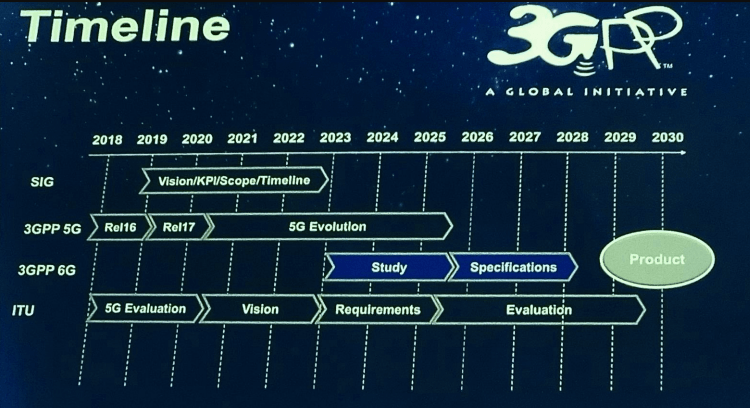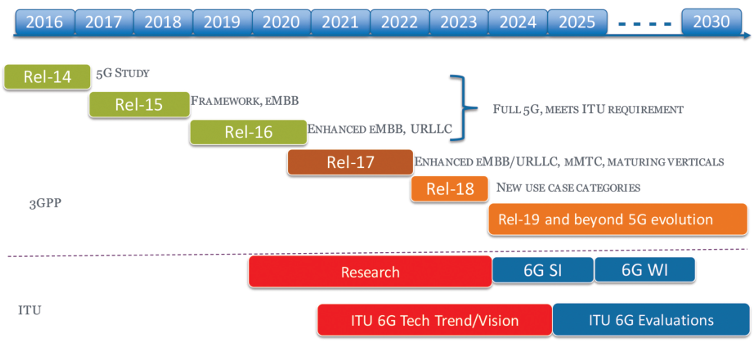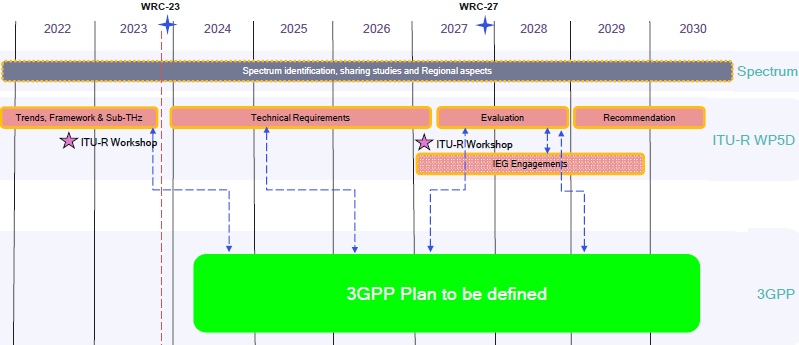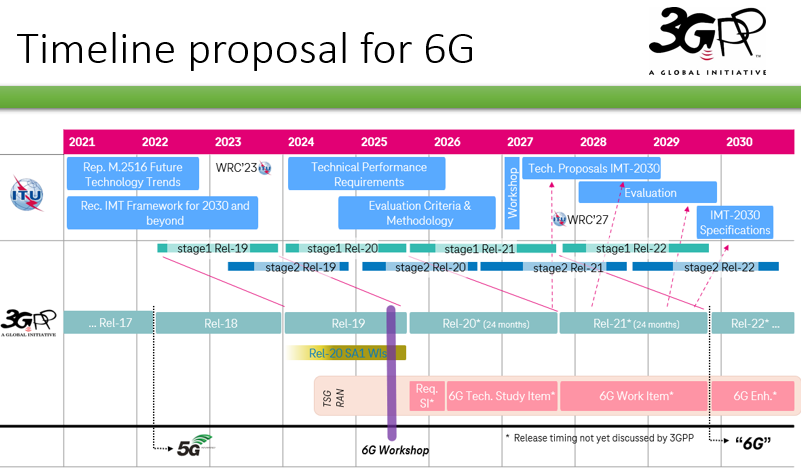|
6G Timeline
Currently (as of Jan, 2025) there is not specific time line defined by 3GPP yet, but at least we start seeing some meaningful proposals from various sources. I am trying to consolidate possible timelines proposed by various sources in this note


Source : Digital Industry Governance and 5G

Source : SP-231091 : 3GPP TSG#101 Bengaluru, India, Sept 11 15, 2023

Source : SP-231044 : 3GPP TSG#101 Bengaluru, India, Sept 11 15, 2023
High Lights
These are highlights from the proposal documents for the time line.
- SP-231091 : 3GPP TSG#101 Bengaluru, India, Sept 11 15, 2023
- 6 usage scenarios defined
- 3 evolutionary from IMT 2020 (5G)
- eMBB --> Immersive Communication
- mMTC --> Massive Communication
- uRLLC --> HRLLC
- 3 new ones
- Artificial Intelligence + Communication
- Sensing + Communication
- Ubiquitous Connectivity
- Spectrum & Regional groups
- IMT 2030 & 6G feature prominently in discussions around future spectrum for IMT systems
- Various spectrum ranges being considered from low band to very high band to everything in between
- Ongoing discussions about spectrum needs linked to specific use cases
- System design of technical, operational characteristics as well as sharing compatibility are highly dependent on the frequency ranges.
- Regional groups have been active in pretty much every geography exploring concepts towards a new generation of cellular systems
- Different regions are finalizing their positions on specific new IMT spectrum bands to be supported at the upcoming WRC 23
- WRC 23 (Nov/Dec 2023) will establish agenda item for new IMT bands to be studied towards WRC 27
- SP-231044 : 3GPP TSG#101 Bengaluru, India, Sept 11 15, 2023
- Two 3GPP releases to be planned forinitial 6G development (as in 5G times)
- Stage1 aim to start (mid) 2024 with studies on potential UC & requirements for 6G
- Stage2 6G studies to be planned starting mid 2025 (delayed compared to other Rel-20 SIDs)
- Plan for a TSG SA & RAN 6G workshop for mid 2025
- 6Gnormative Work Items aspartofRel-21 (First 6G Release)
- Both, Rel-20 and Rel-21 shall be extended to last 24 months
- allowing comprehensive, unrushed UC & requirements as well as technical solutions analysis in Rel-20
- one single set of normative specifications in Rel-21 (no phasing or drops this time, unlike in 5G!)
- This approach
- allows to take outcome of various regional research activities into account for 6G development
- meets the ITU defined timelines by feeding into their process [see LS in SP-230790]
- ensures a timely, comprehensive, single global 6G standard for commercial deployments in 2030+
- 6G Talk - Building future-ready Radio Network with Ari Kynslahti (Nokia)
- The frequency allocation for 6G by ITU-T
- World Radio Conference in Dubai will start the work on 6G frequencies
- Two meetings in 2021 and 2027 to carve out new frequencies
- Sweet spot between 6 and 20 GHz, especially 6-8.5 and 10-13 GHz
- Sub-terahertz band from 90 to 240 GHz for indoor and short range
- The architecture of 6G network
- Only one option, not seven like in 5G
- Upgrade the 5G standalone core with 6G extensions
- Use Multi-RAT spectrum sharing (MRSS) between 5G and 6G
- Respect the macro site grid and build from the current site grid
- The spectral efficiency of 6G radio
- Target 20 times better than 5G
- Increase the carrier bandwidth from 100 MHz to 400 MHz
- Improve the uplink with more antenna elements and TRXs
- Use AI-based air interface to enhance the receiver algorithms
Reference
YouTube
|
|



